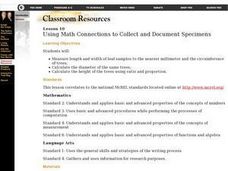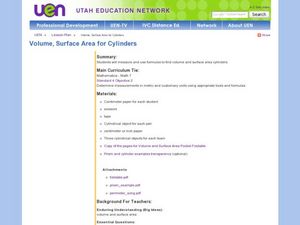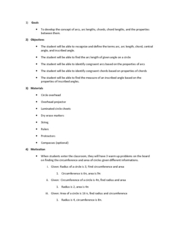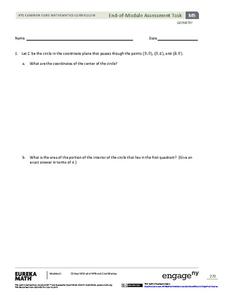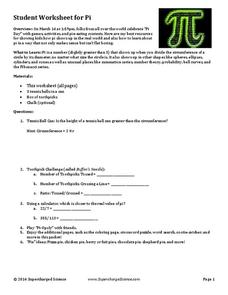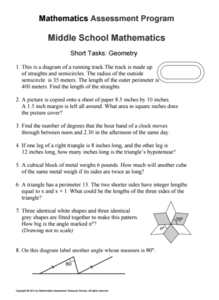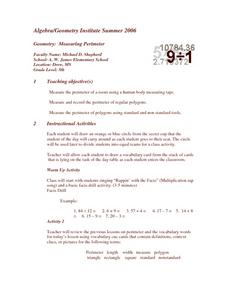Curated OER
Cylinder Volume Lesson Plan
Tenth graders define the formula for cylinders and use it to solve real world problems. In this geometry lesson, pupils differentiate between area, perimeters, 2D shapes, 3D shapes, and volume of prisms, cylinders and spheres. They...
Curated OER
Surface Area and Volume of a Cylinder
Seventh graders find the surface area and volume of a cylinder. In this area and volume instructional activity, 7th graders complete several activities to learn the volume and surface area of cylinders.
Curated OER
Pre-Calculus Review Sheet
Pre-Calculus has some detailed formulas involved and here is a great resource that lumps then all together for you. Broken up into rectangular, polar, and parametric sections, the conics all include formulas and graphs.
Curated OER
Circumference
In this circumference worksheet, students calculate the circumference of circles with equations including pie and measurements. Students complete 5 problems.
Curated OER
Find Radius/Diameter
In this geometry worksheet, students calculate the radius and the diameter of the five given circles. There is an answer key included.
Curated OER
Using Math Concepts to Collect and Document Specimens
Students determine the length and width of leaf samples to the nearest millimeter and the circumference of trees. They participate in a discussion about the importance of collecting specimens carefully. They compile accurate...
Curated OER
Calendar Math
Students count and name the numbers and days on the calendar in order to determine the date. They identify the month and the entire date, and determine the pattern shown on the calendar markers. Students then calculate how many days...
Curated OER
Square Circles
Students analyze and demonstrate how a circle can be measured in square units and examine how diameter, circumference and radius are related.
Curated OER
Perimeter, Circumference and Area
In this measurement learning exercise, students identify the area, perimeter and circumference of a diagram. They also find the size of a pond based on the diagram shown on the sheet. Finally, students calculate how much carpet is needed...
Curated OER
Volume, Surface Area for Cylinders
Seventh graders explore the concept of volume and surface area of cylinders. In this volume and surface area of cylinders lesson, 7th graders break cylinders into their base shapes of a circle and a rectangle. Students discover that...
Curated OER
Properties of Arcs, Lengths and Chords
Students differentiate between the different properties of arcs, arc lengths, chords, and chord lengths. In this circles lesson, students calculate the arc length of a given circle, and find the measure of the inscribed angles of a...
Curated OER
Mountain Math Worksheet
In this number sense instructional activity, 5th graders solve 37 problems based on a given number. Students are asked to round the number, identify the number as even or odd and add 100 to the number.
Mathematics Vision Project
Module 5: Modeling with Geometry
Solids come in many shapes and sizes. Using geometry, scholars create two-dimensional cross-sections of various three-dimensional objects. They develop the lesson further by finding the volume of solids. The module then shifts to finding...
EngageNY
Geometry Module 5: End-of-Module Assessment
The lessons are complete. Learners take an end-of-module assessment in the last installment of a 23-part module. Questions contain multiple parts, each assessing different aspects of the module.
Illustrative Mathematics
Toilet Roll
Potty humor is always a big hit with the school-age crowd, and potty algebra takes this topic to a whole new level. Here the class develops a model that connects the dimensions (radii, paper thickness, and length of paper) of a common...
K12 Reader
Shapes on a Plane
Geometric shapes are the focus of a comprehension exercise that asks readers to examine a short passage about planes, circles, triangles, and rectangles, and then to respond to a series of questions about the article.
Curated OER
Worksheet for Pi
Who needs a pie-eating contest when you have a pi-ology game! Celebrate March 14th with a fun board game about pi and other geometric concepts. As learners answer questions about geometry, they move around the board to collect tokens.
EngageNY
General Pyramids and Cones and Their Cross-Sections
Are pyramids and cones similar in definition to prisms and cylinders? By examining the definitions, pupils determine that pyramids and cones are subsets of general cones. Working in groups, they continue to investigate the relationships...
Los Angeles County Office of Education
Assessment for the California Mathematics Standards Grade 3
Assess scholars' knowledge with a 22-page assessment that covers place value, patterns, probability, estimation, measurement, geometric figures; and their ability to add, subtract, multiply and divide proficiently.
Concord Consortium
Line of Sight
There's no way around it—learners must use trigonometry to model the line of sight around a race track! Using the starting line as the origin, pupils model the straight line distance to any car using a trigonometric expression. The...
Mathematics Assessment Project
Middle School Mathematics Test 3
Real-life mathematics is not as simple as repeating a set of steps; pupils must mentally go through a process to come to their conclusions. Teach learners to read, analyze, and create a plan for solving a problem situation. The provided...
Mathematics Assessment Project
Geometry
Help learners find joy in facing mathematical challenges. The questions posed on this worksheet encourage young mathematicians to utilize skills learned throughout a geometry unit, and to apply themselves and persevere through problem...
Curated OER
A Cone and Its Net
Create and investigate nets for solid shapes with your class. They identify the different parts and faces of each polygon and solid then calculate the surface area and volume of cones. They use circle sectors of varying sizes to build...
Curated OER
Measuring Perimeter
Have your class practice measuring the perimeter of various objects using this resource. Fifth graders place various-sized polygons in order (from largest to smallest). They use non-standard measuring tools to estimate the distance...







